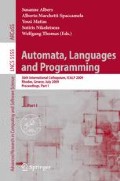Abstract
Randomized rumor spreading is an efficient protocol to distribute information in networks. Recently, a quasirandom version has been proposed and proven to work equally well on many graphs and better for sparse random graphs. In this work we show three main results for the quasirandom rumor spreading model.
We exhibit a natural expansion property for networks which suffices to make quasirandom rumor spreading inform all nodes of the network in logarithmic time with high probability. This expansion property is satisfied, among others, by many expander graphs, random regular graphs, and Erdős-Rényi random graphs.
For all network topologies, we show that if one of the push or pull model works well, so does the other. We also show that quasirandom rumor spreading is robust against transmission failures. If each message sent out gets lost with probability f, then the runtime increases only by a factor of \(\O(1/(1-f))\).
Tobias Friedrich and Thomas Sauerwald were partially supported by postdoctoral fellowships from the German Academic Exchange Service (DAAD).
Access this chapter
Tax calculation will be finalised at checkout
Purchases are for personal use only
Preview
Unable to display preview. Download preview PDF.
References
Berenbrink, P., Elsässer, R., Friedetzky, T.: Efficient randomized broadcasting in random regular networks with applications in peer-to-peer systems. In: 27th ACM Symposium on Principles of Distributed Computing (PODC), pp. 155–164 (2008)
Cooper, C., Frieze, A.M.: The cover time of sparse random graphs. Random Struct. Algorithms 30, 1–16 (2007)
Demers, A.J., Greene, D.H., Hauser, C., Irish, W., Larson, J., Shenker, S., Sturgis, H.E., Swinehart, D.C., Terry, D.B.: Epidemic algorithms for replicated database maintenance. Operating Systems Review 22, 8–32 (1988)
Doerr, B., Friedrich, T., Sauerwald, T.: Quasirandom rumor spreading. In: Proceedings of the 19th Annual ACM-SIAM Symposium on Discrete Algorithms (SODA), pp. 773–781 (2008)
Doerr, B., Friedrich, T., Künnemann, M., Sauerwald, T.: Quasirandom rumor spreading: An experimental analysis. In: Proceedings of the 10th Workshop on Algorithm Engineering and Experiments (ALENEX), pp. 145–153 (2009)
Elsässer, R., Sauerwald, T.: On the Runtime and Robustness of Randomized Broadcasting. In: Asano, T. (ed.) ISAAC 2006. LNCS, vol. 4288, pp. 349–358. Springer, Heidelberg (2006)
Erdős, P., Rényi, A.: On random graphs. Publ. Math. Debrecen 6, 290–297 (1959)
Feige, U., Peleg, D., Raghavan, P., Upfal, E.: Randomized broadcast in networks. Random Structures and Algorithms 1, 447–460 (1990)
Friedman, J.: On the second eigenvalue and random walks in random d-regular graphs. Combinatorica 11, 331–362 (1991)
Frieze, A., Grimmett, G.: The shortest-path problem for graphs with random arc-lengths. Discrete Applied Mathematics 10, 57–77 (1985)
Hedetniemi, S.M., Hedetniemi, S.T., Liestman, A.L.: A survey of gossiping and broadcasting in communication networks. Networks 18, 319–349 (1988)
Hoory, S., Linial, N., Wigderson, A.: Expander graphs and their applications. Bulletin of the American Mathematical Society 43, 439–561 (2006)
Hromkovič, J., Klasing, R., Pelc, A., Ružička, P., Unger, W.: Dissemination of Information in Communication Networks (2005)
Karp, R., Schindelhauer, C., Shenker, S., Vöcking, B.: Randomized Rumor Spreading. In: 41st IEEE Symposium on Foundations of Computer Science (FOCS), pp. 565–574 (2000)
Kempe, D., Dobra, A., Gehrke, J.: Gossip-based computation of aggregate information. In: 44th IEEE Symposium on Foundations of Computer Science (FOCS), pp. 482–491 (2003)
Pittel, B.: On spreading a rumor. SIAM Journal on Applied Mathematics 47, 213–223 (1987)
Sauerwald, T.: On mixing and edge expansion properties in randomized broadcasting. In: Tokuyama, T. (ed.) ISAAC 2007. LNCS, vol. 4835, pp. 196–207. Springer, Heidelberg (2007)
Author information
Authors and Affiliations
Editor information
Editors and Affiliations
Rights and permissions
Copyright information
© 2009 Springer-Verlag Berlin Heidelberg
About this paper
Cite this paper
Doerr, B., Friedrich, T., Sauerwald, T. (2009). Quasirandom Rumor Spreading: Expanders, Push vs. Pull, and Robustness. In: Albers, S., Marchetti-Spaccamela, A., Matias, Y., Nikoletseas, S., Thomas, W. (eds) Automata, Languages and Programming. ICALP 2009. Lecture Notes in Computer Science, vol 5555. Springer, Berlin, Heidelberg. https://doi.org/10.1007/978-3-642-02927-1_31
Download citation
DOI: https://doi.org/10.1007/978-3-642-02927-1_31
Publisher Name: Springer, Berlin, Heidelberg
Print ISBN: 978-3-642-02926-4
Online ISBN: 978-3-642-02927-1
eBook Packages: Computer ScienceComputer Science (R0)

